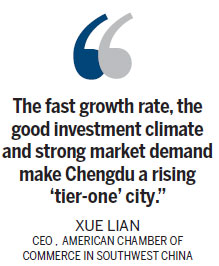Visa-free practice more fuel for soaring Chengdu


As international investors increase in Chengdu, the 72-hour visa-free policy that started last September has received a hearty welcome from businessmen who need to conveniently tend to their interests.
Chengdu is the fourth city in China, and the first in the western region, to offer visa-free stays following Beijing, Shanghai and Guangzhou.
The policy allows citizens of 51 countries who have a flight tickets to a third country to spend three days in the city.

Even amid a stagnant global economy and slowing domestic growth, Chengdu's GDP grew from 390 billion yuan ($62.7 billion) in 2009 to more than 900 billion yuan last year, some 8 percent of the total in the entire West China region.
By the end of last year, 252 Fortune 500 companies had offices in Chengdu.
Andy Serwer, managing editor of the Fortune magazine, said the city is "a dynamic magnet for multinational companies".
Xue Lian, CEO of the American Chamber of Commerce in Southwest China certainly agrees.
"The fast growth rate, the good investment climate and strong market demand make Chengdu a rising 'tier-one' city," said Xue.
She told China Daily that the number of the chamber's members has increased 10-fold to more than 300 in less than 10 years with businesses represented expanding from manufacturing into a range of sectors including IT, finance and consultation.

She said that the AmCham Southwest is now the largest and most influential overseas chamber of commerce in the region, with the largest share of foreign companies in Chengdu from the United States.
According to the latest China Business Report from the American Chamber of Commerce in Shanghai - the largest US chamber of commerce in the Asia-Pacific region - Chengdu is the now the most preferred Chinese city for investment by US companies.
Syed Mohamad Fairus Shaik Ismail, director of the Malaysia External Trade Development Corp's Chengdu office, is also "optimistic about the current investment environment in the city".
He said the city is upgrading both its "hardware" and "software" in infrastructure, transportation, services and talent pool.
One of the major Malaysian investments in Chengdu is Hong Leong Bank, which has a 20 percent equity share in the Bank of Chengdu, he noted.
Last year the Chengdu bank remained a key contributor to the Hong Leong Bank's profit, with its contribution growing by 21.7 percent.
"Hong Leong Bank has increased its investment in Bank of Chengdu in recent years to support growth in new businesses as well as new markets," said Syed.
The 72-hour visa-free policy will promote both business and tourism, said Xue Lian.
"As many US companies are considering establishing their regional headquarters in Chengdu, the new policy will bring great convenience to foreign businesspeople."
Syed said he believes more international passengers will prefer Chengdu to be their transit city when planning a long-haul journey.
"International passengers who transit via (Chengdu's) Shuangliu International Airport will take this opportunity to better experience the city's development and the warm hospitality of local people," he said.
In 2013, 155 million tourists visited the city, an increase of 27.7 percent from the previous year. Tourism revenue reached 133 billion yuan.
This year, the city government of Chengdu projects that tourism revenue will reach 166.3 billion yuan as 186 million tourists visit the city, said local officials.
zhangzhao@chinadaily.com.cn
(China Daily European Weekly 05/16/2014 page23)
Today's Top News
- Takaichi must stop rubbing salt in wounds, retract Taiwan remarks
- Millions vie for civil service jobs
- Chinese landmark trade corridor handles over 5m TEUs
- China holds first national civil service exam since raising eligibility age cap
- Xi's article on CPC self-reform to be published
- Xi stresses improving long-term mechanisms for cyberspace governance






























